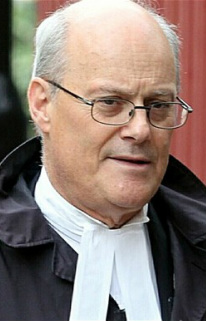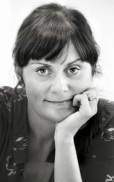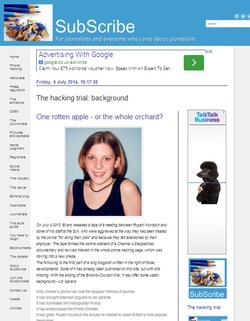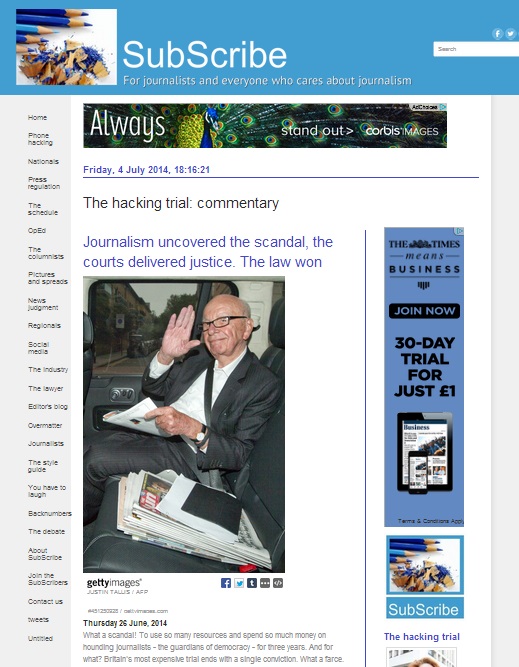Phone hacking: sentences
'The News of the World delayed telling the police the contents of the voicemail until they realised they were not going
|
|
Andy Coulson
18 months There is insufficient evidence to conclude that he started the phone hacking, but there is ample evidence that it increased enormously while he was the editor.
He knew about it and encouraged it when he should have stopped it. |
Neville Thurlbeck 6 months

He was not some minor cog in the wheel at the News of the World. He was an important and distinguished journalist.
|
Greg Miskiw
6 months The good character of Miskiw, Thurlbeck and Weatherup counts for very little. They would not have held the senior positions at the newspaper that they did if they were not well-respected journalists.
It was because of the respect in which they were held that they were able to get away with this criminal conduct for so long |
James Weatherup
4 months suspended, 200 hours community service
4 months suspended, 200 hours community service

You were less involved. You returned to the News of the World when phone hacking was well established as a way of getting stories. You were involved for a shorter period of time. I accept that you may have been unhappy with the situation in which you found yourself and that may explain your demotion
Glenn Mulcaire
6 months suspended, 200 hours of community service
6 months suspended, 200 hours of community service

I reject the mitigation that he hacked the phone of Milly Dowler in the belief that he was doing it in some way to assist the police. He knew perfectly well that he was hacking Milly's phone to assist the News of the World to obtain a story by finding her...
Mr Mulcaire you are truly the lucky one. It would be wrong to send you back to prison today when you have already served a prison sentence, although one that was too short to reflect the full extent of your hacking activities
Mr Mulcaire you are truly the lucky one. It would be wrong to send you back to prison today when you have already served a prison sentence, although one that was too short to reflect the full extent of your hacking activities
Dan Evans
10 months suspended, 200 hours of community service
10 months suspended, 200 hours of community service
It was all about selling newspapers

July 4, 2014 Four distinguished journalists who had no need to break the law to be successful hacked thousands of telephones to make sure that they got the biggest headlines and sold the most newspapers, Mr Justice Saunders said, passing sentence at the Old Bailey.
They targeted celebrities, politicians, royalty, and friends, family and colleagues of the famous. One woman's phone was hacked just because her surname was Rooney.
They picked up intensely personal messages about relationships and confidential messages from doctors and clinics to their patients. The resultant stories caused serious upset and distress and created an undercurrent of distrust between friends and family who suspected each other of selling their stories.
Andy Coulson, Greg Miskiw, Neville Thurlbeck and James Weatherup all achieved a great deal without resorting the the unlawful invasion of other people's privacy, the judge said. "Those achievements will now count for nothing. Their reputations and their careers are irreparably damaged."
He added later: "There is a certain irony in seeing men who pride themselves on being distinguished investigative journalists, who had shed light in dark corners and forced others to reveal the truth, being unprepared to do the same for their own profession. That would require great courage, but the best investigative journalists have never been short of courage."
Judge Saunders pointed to the pressure on Coulson to maintain and increase market share and how it was passed down the paper's hierarchy, leading to great competition between desks. There was considerable pressure on desk heads to get good headline-grabbing stories every week - with little concern for how they got them.
"Apart from phone hackings, personal phone data was obtained, presumably by deceiving phone companies; rubbish bins were gone through and surveillance was carried out by skilled investigators."
The paper had made important contributions to public life entirely unrelated to phone hacking, "nevertheless, the editor and others clearly thought it necessary to use phone hacking to find important stories to maintain their competitive edge". They claimed not to know that it was illegal, but they knew that it was against the PCC code and they knew that it was morally wrong. Ignorance of the law was no defence, nor in this case, was it any mitigation.
When it came to listening to Milly Dowler's voicemail, Glenn Mulcaire's claim that he thought he was assisting the police was incapable of belief, the judge said. "The News of the World were using their resources to try to find Milly Dowler. The fact that they delayed telling the police of the contents of the voicemail demonstrates that their true motivation was not to act in the best interests of the child but to get credit for finding her and thereby sell the maximum number of newspapers."
Mulcaire had picked up a message that had been left on Milly's phone by mistake. "A team of reporters were despatched to find her. They failed. As we now know, Milly was already dead. The News of the World delayed telling the police the contents of the voicemail until they realised that they were not going to find Milly. That was unforgivable and could only, in my judgment, have happened with the knowledge of the person editing the paper that week: Andy Coulson."
Hacking may not have started under Coulson's editorship, but it had increased enormously while he was in charge and his reputation grew through the stories so obtained. "When he resigned, he did so so with his reputation intact. News International decided it was appropriate to make a substantial severance payment."
The judge opened his remarks by saying that some people would be outraged that he hadn't passed sentences well over the maximum two years; others would think that it shouldn't be a crime for the Press to intrude into the lives of the famous and that the prosecution was an attack on the freedom of the Press.
"It is not my job to make observations about the relationship between the Press, the police and politicians, nor is it my job to comment on whether this trial has been worth the expense incurred, except perhaps I can observe that it is not necessarily correct ot measure the value of a trial only in terms of the number of people convicted or the severity of the sentences.
"What is important is the amount of phone hacking that went on for the benefit of the News of the World and over what period. It had started by April 2002 when Milly Dowler's phone was hacked and continued until August 2006. The amount of phone hacking increased to the level where Glenn Mulcaire was saying the he couldn't cope...There were many thousands of phone hacks and many hundreds of voicemails."
Some celebrities had attempted to use the Press to put themselves in the best possible light, some people were prepared to sell information to the News of the World. "None of this justified hacking," the judge said. "The law's protection is given to the rich, famous and powerful as it is to all."
They targeted celebrities, politicians, royalty, and friends, family and colleagues of the famous. One woman's phone was hacked just because her surname was Rooney.
They picked up intensely personal messages about relationships and confidential messages from doctors and clinics to their patients. The resultant stories caused serious upset and distress and created an undercurrent of distrust between friends and family who suspected each other of selling their stories.
Andy Coulson, Greg Miskiw, Neville Thurlbeck and James Weatherup all achieved a great deal without resorting the the unlawful invasion of other people's privacy, the judge said. "Those achievements will now count for nothing. Their reputations and their careers are irreparably damaged."
He added later: "There is a certain irony in seeing men who pride themselves on being distinguished investigative journalists, who had shed light in dark corners and forced others to reveal the truth, being unprepared to do the same for their own profession. That would require great courage, but the best investigative journalists have never been short of courage."
Judge Saunders pointed to the pressure on Coulson to maintain and increase market share and how it was passed down the paper's hierarchy, leading to great competition between desks. There was considerable pressure on desk heads to get good headline-grabbing stories every week - with little concern for how they got them.
"Apart from phone hackings, personal phone data was obtained, presumably by deceiving phone companies; rubbish bins were gone through and surveillance was carried out by skilled investigators."
The paper had made important contributions to public life entirely unrelated to phone hacking, "nevertheless, the editor and others clearly thought it necessary to use phone hacking to find important stories to maintain their competitive edge". They claimed not to know that it was illegal, but they knew that it was against the PCC code and they knew that it was morally wrong. Ignorance of the law was no defence, nor in this case, was it any mitigation.
When it came to listening to Milly Dowler's voicemail, Glenn Mulcaire's claim that he thought he was assisting the police was incapable of belief, the judge said. "The News of the World were using their resources to try to find Milly Dowler. The fact that they delayed telling the police of the contents of the voicemail demonstrates that their true motivation was not to act in the best interests of the child but to get credit for finding her and thereby sell the maximum number of newspapers."
Mulcaire had picked up a message that had been left on Milly's phone by mistake. "A team of reporters were despatched to find her. They failed. As we now know, Milly was already dead. The News of the World delayed telling the police the contents of the voicemail until they realised that they were not going to find Milly. That was unforgivable and could only, in my judgment, have happened with the knowledge of the person editing the paper that week: Andy Coulson."
Hacking may not have started under Coulson's editorship, but it had increased enormously while he was in charge and his reputation grew through the stories so obtained. "When he resigned, he did so so with his reputation intact. News International decided it was appropriate to make a substantial severance payment."
The judge opened his remarks by saying that some people would be outraged that he hadn't passed sentences well over the maximum two years; others would think that it shouldn't be a crime for the Press to intrude into the lives of the famous and that the prosecution was an attack on the freedom of the Press.
"It is not my job to make observations about the relationship between the Press, the police and politicians, nor is it my job to comment on whether this trial has been worth the expense incurred, except perhaps I can observe that it is not necessarily correct ot measure the value of a trial only in terms of the number of people convicted or the severity of the sentences.
"What is important is the amount of phone hacking that went on for the benefit of the News of the World and over what period. It had started by April 2002 when Milly Dowler's phone was hacked and continued until August 2006. The amount of phone hacking increased to the level where Glenn Mulcaire was saying the he couldn't cope...There were many thousands of phone hacks and many hundreds of voicemails."
Some celebrities had attempted to use the Press to put themselves in the best possible light, some people were prepared to sell information to the News of the World. "None of this justified hacking," the judge said. "The law's protection is given to the rich, famous and powerful as it is to all."
The reporter who got out
|
Given one news editor would regularly demand the numbers of my own contacts, some of whom had also lost loved ones, I find the hacking of the phones of murder victims and their families particularly troubling.
But if a reporter had finally been able to stand up the endless accusations about Jimmy Savile, or evidence of a paedophile ring at the heart of Government, would the public see it as in their interest? - Bethany Usher, lecturer in journalism at Teesside University writing for Press Gazette |
Behind the sentences
Coulson
Starting point two years
(the maximum)
limited allowance for good character in showing "help and kindness to others when they have faced personal tragedy and difficulties".
Allowance for delay in case coming to trial, which was not his fault, and the fact the offences were committed many
years ago
Final sentence:
eighteen months
Usually expect to serve half, could be released on electronic tag in about six months.
Thurbeck and Miskiw
Starting point twelve months
Maximum one-third reduction for guilty plea - even though this did not come at the first opportunity - because the pleas had saved the country "a great deal of money".
No allowance for remorse - they made no contribution to the investigation and expressions of remorse "has the appearance of regret for the consequences of getting caught".
Two months allowance for the delay in the case coming to trial and private mitigation that did not include their records as journalists. Final sentence:
six months. Would usually expect to serve three, but a further 53 days reduction to take into account time spent under curfew last year.
Weatherup
Starting point eight months.
Maximum allowance of a third for guilty plea, plus further allowances for the delay and time spent under curfew.
"As a consequence, the length of time you would actually serve would be very short. I consider that it is appropriate, very exceptionally, to suspend the sentence in your case.
Final sentence:
four months, suspended for one year;
200 hours unpaid work for the community
Mulcaire
"If a full investigation had been carried out in 2007 then all those matters could have been dealt with at the same time. It is not your fault that they were not."
Final sentence:
six months, suspended for a year;
200 hours of unpaid work for the community
Read the judge's full sentencing remarks here
Coulson
Starting point two years
(the maximum)
limited allowance for good character in showing "help and kindness to others when they have faced personal tragedy and difficulties".
Allowance for delay in case coming to trial, which was not his fault, and the fact the offences were committed many
years ago
Final sentence:
eighteen months
Usually expect to serve half, could be released on electronic tag in about six months.
Thurbeck and Miskiw
Starting point twelve months
Maximum one-third reduction for guilty plea - even though this did not come at the first opportunity - because the pleas had saved the country "a great deal of money".
No allowance for remorse - they made no contribution to the investigation and expressions of remorse "has the appearance of regret for the consequences of getting caught".
Two months allowance for the delay in the case coming to trial and private mitigation that did not include their records as journalists. Final sentence:
six months. Would usually expect to serve three, but a further 53 days reduction to take into account time spent under curfew last year.
Weatherup
Starting point eight months.
Maximum allowance of a third for guilty plea, plus further allowances for the delay and time spent under curfew.
"As a consequence, the length of time you would actually serve would be very short. I consider that it is appropriate, very exceptionally, to suspend the sentence in your case.
Final sentence:
four months, suspended for one year;
200 hours unpaid work for the community
Mulcaire
"If a full investigation had been carried out in 2007 then all those matters could have been dealt with at the same time. It is not your fault that they were not."
Final sentence:
six months, suspended for a year;
200 hours of unpaid work for the community
Read the judge's full sentencing remarks here
It's right that justice should be done
and that no one is above the law -
as I've always said
- David Cameron
and that no one is above the law -
as I've always said
- David Cameron
No one could take pleasure from the sentences handed down.
These sentences are the inevitable outcome of a colossal failure of corporate governance within News International that allowed a culture of criminal behaviour to fester for many years
- Hacked Off
These sentences are the inevitable outcome of a colossal failure of corporate governance within News International that allowed a culture of criminal behaviour to fester for many years
- Hacked Off
I think, once again, it throws up very serious questions about David Cameron's judgment in bringing a criminal into the heart of Downing Street despite repeated warnings
- Ed Miliband
- Ed Miliband
We still can't understand why anyone would think that cheap headlines or a good way to get a story would be to invade somebody's life at the deepest and darkest point of their life
- Graham Foulkes, whose son was killed in the 7/7 London bombings
- Graham Foulkes, whose son was killed in the 7/7 London bombings
Please sign up for SubScribe updates
(no spam, no more than one every week or two)
|
|
|














